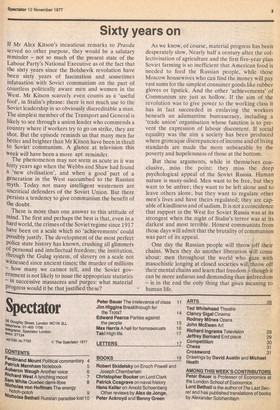Sixty years on
If Mr Alex Kitson's incautious remarks to Pravda served no other purpose, they would be a salutary reminder — not so much of the present state of the Labour Party's National Executive as of the fact that the sixty years since the Bolshevik revolution have been sixty years of fascination and sometimes infatuation with Soviet communism on the part of countless politically aware men and women in the West. Mr Kitson scarcely even counts as a 'useful fool', in Stalin's phrase: there is not much use to the Soviet leadership in so obviously discreditable a man. The simplest member of the Transport and General is likely to see through a union leader who commends a country where if workers try to go on strike, they are shot. But the episode reminds us that many men far better and brighter than Mr Kitson have been in thrall to Soviet communism. A glance at television this week will have been a more apt reminder.
The phenomenon may not seem as acute as it was forty years ago when the Webbs and Shaw had found a 'new civilisation', and when a good part of a generation in the West succumbed to the Russian myth. Today not many intelligent westerners are uncritical defenders of the Soviet Union. But there persists a tendency to give communism the benefit of the doubt.
There is more than one answer to this attitude of Mind. The first and perhaps the best is that, even in a hard world, the crimes of the Soviet regime since 1917 have been on a scale which no 'achievements' could Possibly justify. The development of the most perfect Police state history has known, crushing all glimmers of personal and intellectual freedom; the institution, through the Gulag system, of slavery on a scale not witnessed since ancient times; the murder of millions — how many we cannot tell, and the Soviet government is not likely to issue the appropriate statistics — in successive massacres and purges: what material progress would it be that justified these? As we know, of course, material progress has been desperately slow. Nearly half a century after the collectivisation of agriculture and the first five-year plan Soviet farming is so inefficient that American food is needed to feed the Russian people, while those Moscow housewives who can find the money will pay vast sums for the simplest consumer goods like rubber gloves or lipstick. And the other 'achievements' of Communism are just as hollow. If the aim of the revolution was to give power to the working class it has in fact succeeded in enslaving the workers beneath an adamantine bureaucracy, including a 'trade union' organisation whose function is to prevent the expression of labour discontent. If social equality was the aim a society has been produced where grotesque discrepancies of income and of living standards are made the more unbearable by the poverty and hopelessness of those at the bottom.
But these arguments, while in themselves conclusive, miss the point: they miss the deep psychological appeal of the Soviet Russia. Human nature is many-sided. Men want to be free, but they want to be unfree; they want to be left alone and to leave others alone, but they want to regulate other men's lives and have theirs regulated; they are capable of kindliness and of sadism. It is not a coincidence that support in the West for Soviet Russia was at its strongest when the night of Stalin's terror was at its darkest and most terrible. Honest communists from those days will admit that the brutality of communism was part of its appeal.
One day the Russian people will throw off their chains. When they do another liberation will come about: men throughout the world who gaze with masochistic longing at closed societies will throw off their mental chains and learn that freedom — though it can be more arduous and demanding than unfreedom — is in the end the only thing that gives meaning to human life.


































 Previous page
Previous page